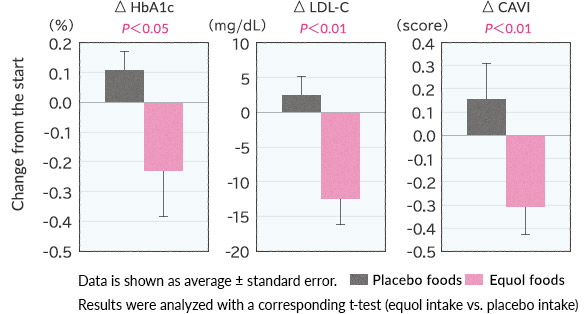14. Effects of natural S-equol supplements on overweight or obesity and metabolic syndrome in the Japanese, based on sex and equol status
Usui T, Tochiya M, Sasaki Y, Muranaka K, Yamakage H, Himeno A, Shimatsu A, Inaguma A, Ueno T, Uchiyama S, Satoh-Asahara N (2013)
Clin Endocrinology; 78, 365-372
Metabolic syndrome
It is believed that for post-menopausal women, a continued state of estrogen deficiency increases the risk of lifestyle-related diseases, through changes such as a rise in blood pressure and the level of LDL cholesterole (LDL-C); these in turn can exacerbate the aging process. To reduce these risks, it is important to ensure adequate health care after menopause, when the level of estrogen declines rapidly.
Study outline and results
A cross-over test was conducted on 49 (15 men and 34 post-menopausal women) obese outpatients of metabolic clinics with a body mass index (BMI) of ≧25kg/m2, between the ages of 31 and 77. After 12 weeks of 10mg/day of equol, or a placebo treatment, the group that received equol showed a significant decrease in risk factors for diabetes and arteriosclerosis. In particular, remarkable effects were observed in post-menopausal, non-equol producing women.
As a result, the changes in HbA1C, LDL-C, and CAVI decreased in the equol group.
| HbA1C | Hemoglobin bound to glucose. This indicates the risk of diabetes. |
|---|---|
| LDL-C | Also referred to as bad cholesterol. This indicates the risk of arteriosclerosis. |
| CAVI | Cardio-Ankle Vascular Index (CAVI) is an indicator of the stiffness of the arteries, which extend from the heart to the ankle. |







